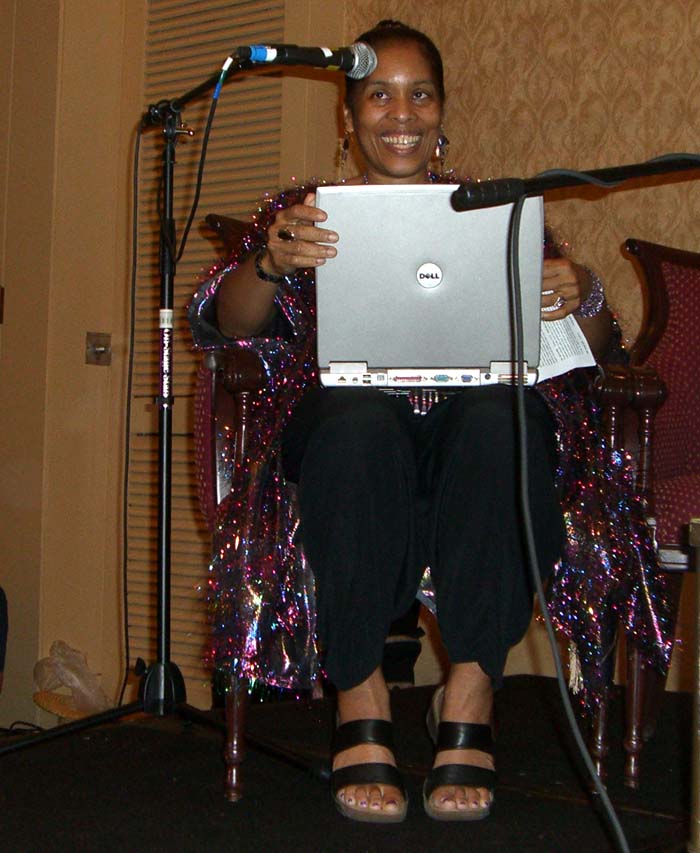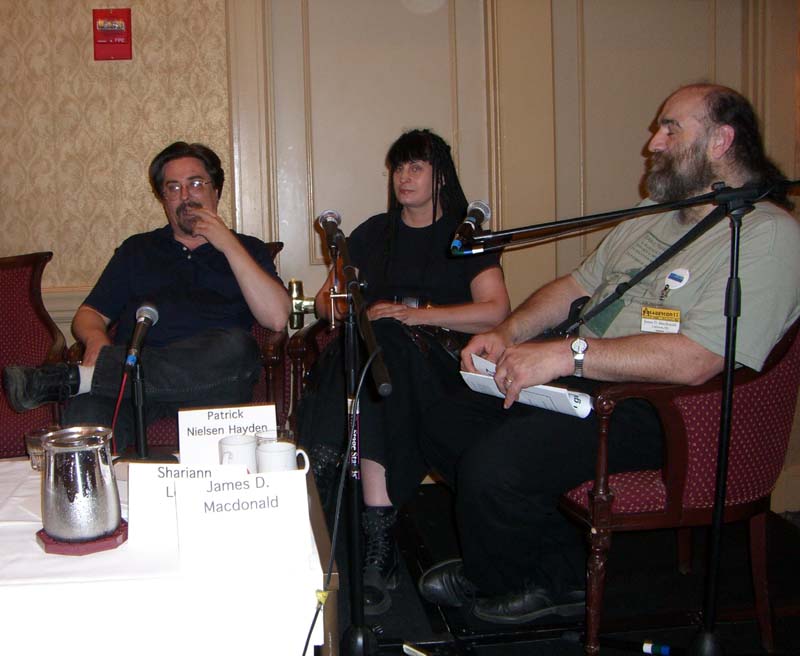Social Class in Science Fiction panel at Readercon 2006
This was another panel where I heard some new-to-me ideas, and enjoyed it a lot. The most unusual one was that the very notion of a protagonist is a classist invention.
Andrea Hairston opens with general observations about the matters of class in the US.
. One of our major fantasies is that we are a society made up of individual achievements. And a mobile society mythology. But we have never been a particularly socially mobile society. We are 18th in the world. European societies are more mobile than we are. You are more likely to drop in America than to rise, and odds are you will die in the class you were born in. But people all over the world rush here, leaving behind societies where social mobility is more possible.
We also have welfare queen mythology, that poor people are lazy and suck up government resources. The working poor are invisible. And those who work hard and remain poor are really invisible. And poverty is [portrayed as] an individual matter, not systemic.
Class is also gendered. There are more rich men and poor women.
and concludes:
Every narrative that you create must have some class structure, or an explanation for its absence. Not necessarily hierarchical.

China Mieville points out that traditional fantasy idealizes feudalism. It leans on the notion of “good king”, as in J. R. R. Tolkien’s “Lord of the Rings”; in the same trilogy, the orcs speak Cockney dialect. The industrialization of Shire is presented as a bad thing, although in reality it may not be bad. Same with much of the classic science fiction: the prevalence of stories about “manifest-destinishly going out into space or another land and taking over” is a glorious depiction of imperialism, and is not disaggregated from class.
This, so far, is easy to see. But then China Mieville takes it one step further. According to him, one of the stock figures of literature is a protagonist, and the very notion of protagonist is a bourgeois notion. He also gives examples of writers who challenge it, such as Delaney and Ballard, and even Philip K. Dick. “His characters are poor little guys to who the society keeps happening. He’s an intelligent enough writer to understand that separation of the society and an individual doesn’t actually work.”
Even some of the panelists are taken aback by what China Mieville said about a protagonist being a bourgeois manifestation. For example, Patrick Nielsen Hayden admits so. But he agrees that “a lot of science fiction has been written with ridiculously unrealistic depiction of present day or future class issues. There’s a great opportunity for people to write different kind of SF.”
And he brings up another good point.
Patrick Nielsen Hayden. Science fiction and fantasy are tools for young people to figure out how the world works. Too much ragging on the individual thing alienates young readers. [Negation of individualism] doesn’t speak to the young people. It is hard to empower young people without having them to believe that they have individual power.
Andrea Hairston. That’s not the same as believing that we can change the world single-handedly without the cooperation from the society.

China Mieville. It’s not to say, your book is reactionary unless you bring in a class act. But the notion of separation between the individual and the society, I think it’s a problem.
Shariann Lewitt. In some ways what is a definition of a protagonist, is turning into a notion of a particular type of character that we see a great deal of: an individual hero that saves the universe. But that’s not the only kind of protagonist.
I heard a very interesting talk a number of years ago. Somebody talked about fantasy tropes. People are writing fantasy and reading and some of its popularity is because it’s there to reinforce conservation of social notions that people find reassuring. It’s hard for people to enjoy recreational reading that challenges the way you think about the world. Readers want to be reassured that they are the good guys.
Andrea Hairston. Hierarchy is thrilling.
James Macdonald. Another reason we have protagonists is that human beings can keep only 2-3 characters in mind. Others get pushed out of our head.
Teresa Nielsen Hayden. We are hardwired for story. Story affects us profoundly. We favor stories with one or a handful major characters, because that’s how a story coheres for us. Satisfactory stories tend to be about consequential action in the world, so they tend to be about these people. […] For the sake of having a satisfactory story that talks about action in a way that speaks to us, you have characters that do things that have consequences in the world, even if it means that a handful of people cause amazing things to happen. I don’t know that it inherently works out to a bad depiction of class relations. […]

That said, some people point out how the trope of the manifest destiny in fantasy works can be harmful.
Shariann Lewitt. The whole notion of individual destiny is a way to circumvent having to deal with any political ramifications. It is a way to ignore the issue. A lot of problem in the genre is not that we have these illusions and we’ll attack them: many writers write as if they don’t exist.
Patrick Nielsen Hayden. There are writers whose agenda is to undercut this kind of analysis completely.